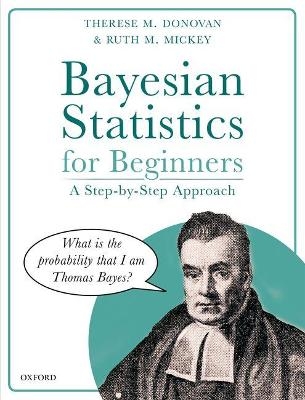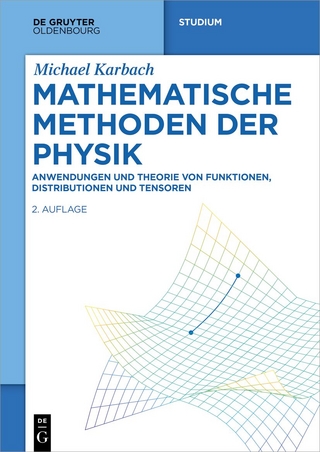
Bayesian Statistics for Beginners
Oxford University Press (Verlag)
978-0-19-884129-6 (ISBN)
Bayesian statistics is currently undergoing something of a renaissance. At its heart is a method of statistical inference in which Bayes' theorem is used to update the probability for a hypothesis as more evidence or information becomes available. It is an approach that is ideally suited to making initial assessments based on incomplete or imperfect information; as that information is gathered and disseminated, the Bayesian approach corrects or replaces the assumptions and alters its decision-making accordingly to generate a new set of probabilities. As new data/evidence becomes available the probability for a particular hypothesis can therefore be steadily refined and revised. It is very well-suited to the scientific method in general and is widely used across the social, biological, medical, and physical sciences. Key to this book's novel and informal perspective is its unique pedagogy, a question and answer approach that utilizes accessible language, humor, plentiful illustrations, and frequent reference to on-line resources.
Bayesian Statistics for Beginners is an introductory textbook suitable for senior undergraduate and graduate students, professional researchers, and practitioners seeking to improve their understanding of the Bayesian statistical techniques they routinely use for data analysis in the life and medical sciences, psychology, public health, business, and other fields.
Therese Donovan is a wildlife biologist with the U.S. Geological Survey, Vermont Cooperative Fish and Wildlife Research Unit. Based in the Rubenstein School of Environment and Natural Resources at the University of Vermont, Therese teaches graduate courses on ecological modeling and conservation biology. She works with a variety of student and professional collaborators on research problems focused on the conservation of vertebrates. Therese is the Director of the Vermont Cooperative Fish and Wildlife Unit Spreadsheet Project, a suite of on-line tutorials in Excel and R for modeling and analysis of wildlife populations. She lives in Vermont with her husband, Peter, and two children, Evan and Ana. Ruth Mickey is a Professor Emerita of Statistics at the University of Vermont. Most of Ruth's career was spent in the Department of Mathematics and Statistics, where she taught courses in Applied Multivariate Analysis, Categorical Data, Survey Sampling, Analysis of Variance and Regression, and Probability. She served as an advisor or committee member of numerous MS and PhD committees over a broad range of academic disciplines. She worked on the development of statistical methods and applications to advance public health and natural resources issues throughout her career.
Section 1
Basics of Probability
1: Introduction to Probability
2: Joint, Marginal, and Conditional Probability
Section 2
Bayes' Theorem and Bayesian Inference
3: Bayes' Theorem
4: Bayesian Inference
5: The Author Problem - Bayesian Inference with Two Hypotheses
6: The Birthday Problem: Bayesian Inference with Multiple Discrete Hypotheses
7: The Portrait Problem: Bayesian Inference with Joint Likelihood
Section 3
Probability Functions
8: Probability Mass Functions
9: Probability Density Functions
Section 4
Bayesian Conjugates
10: The White House Problem: The Beta-Binomial Conjugate
11: The Shark Attack Problem: The Gamma-Poisson Conjugate
12: The Maple Syrup Problem: The Normal-Normal Conjugate
Section 5
Markov Chain Monte Carlo
13: The Shark Attack Problem Revisited: MCMC with the Metropolis Algorithm
14: MCMC Diagnostic Approaches
15: The White House Problem Revisited: MCMC with the Metropolis-Hastings Algorithm
16: The Maple Syrup Problem Revisited: MCMC with Gibbs Sampling
Section 6
Applications
17: The Survivor Problem: Simple Linear Regression with MCMC
18: The Survivor Problem Continued: Introduction to Bayesian Model Selection
19: The Lorax Problem: Introduction to Bayesian Networks
20: The Once-ler Problem: Introduction to Decision Trees
Appendices
Appendix 1: The Beta-Binomial Conjugate Solution
Appendix 2: The Gamma-Poisson Conjugate Solution
Appendix 3: The Normal-Normal Conjugate Solution
Appendix 4: Conjugate Solutions for Simple Linear Regression
Appendix 5: The Standardization of Regression Data
| Erscheinungsdatum | 30.05.2019 |
|---|---|
| Verlagsort | Oxford |
| Sprache | englisch |
| Maße | 193 x 247 mm |
| Gewicht | 1038 g |
| Themenwelt | Mathematik / Informatik ► Mathematik ► Angewandte Mathematik |
| Mathematik / Informatik ► Mathematik ► Statistik | |
| ISBN-10 | 0-19-884129-9 / 0198841299 |
| ISBN-13 | 978-0-19-884129-6 / 9780198841296 |
| Zustand | Neuware |
| Haben Sie eine Frage zum Produkt? |
aus dem Bereich


